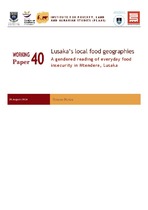Lusaka’s local food geographies: A gendered reading of everyday food insecurity in Mtendere, Lusaka
Abstract
Little is known about how individual abilities and food security determinants - at the scale of everyday
life - connect to formal and informal value chains, and broader urban structural systems in which daily
processes are embedded. Structural inequalities in urban systems make it difficult to translate economic
development into improved food security at different city, household or individual scales. Exploring
current a-scalar and anti-urban food security policies and practice in Southern Africa, the paper argues
that everyday food security strategies - which enable food access and sharing in food communities - are
enmeshed in local food system structures. Everyday food strategies are a critical source of livelihoods and
are also deeply relational processes, tied to power, identity and agency. The paper also looks at how
contextualised food security outcomes are affected by place, space and negotiations of everyday life. The
aim is to challenge narrow value chain theories that do not recognise the ‘other’ - currently invisible
networks and interactions - in and between local food value chains, such as what and who constitutes
value, and who holds the power to assign value in local food networks. The paper draws on a wide
literature review and in-depth qualitative work conducted in Lusaka, Zambia. The paper concludes
arguing that deeper nuances affect everyday food security outcomes, and this paper purposefully furthers
the current (limited) conversation and empirical understanding of food security within value chains
analysis.

